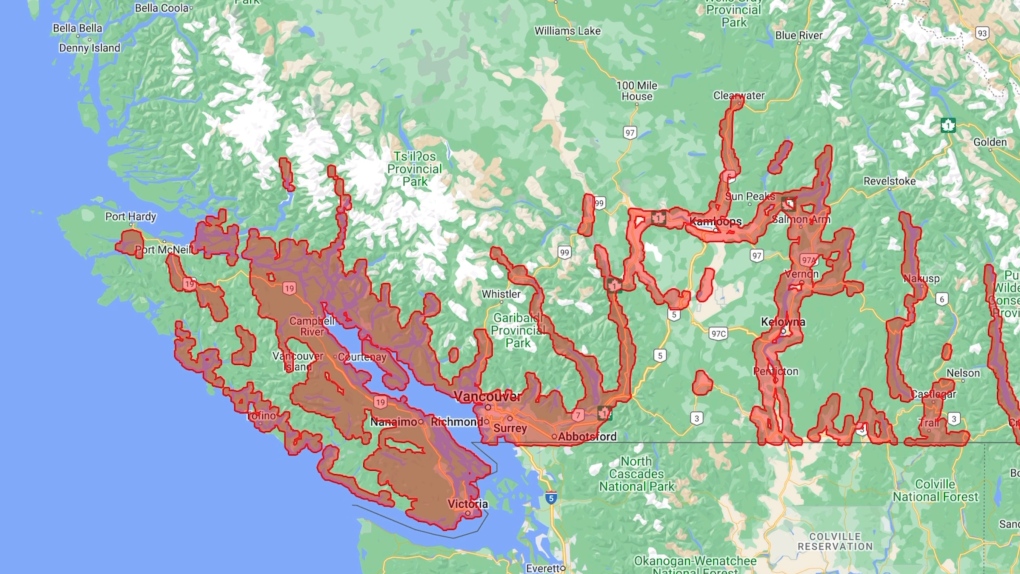'Your best defence is coverage': How to avoid ticks on Vancouver Island
Maureen Harrison walks her brother’s dogs around Thetis Lake daily. When the walk is over, she says checking the pair for ticks is a must.
"Just go behind their ears," said Harrison. "All the places that the ticks like to be."
In British Columbia, some Western black-legged ticks carry a bacteria that causes Lyme disease. That bacteria gets transferred to the recipient when the tick burrows its head into the skin, draws bloods, spits some back out, then falls off the body.
The two dogs that Harrison walks daily have had ticks found on them before.
"[Ticks] have got little hooks on the top of their head and you can just turn them a little bit and draw them out," she said.
Lyme disease can lead to long-term health complications for people and pets.
Those can include chronic symptoms like arthritis, as well as neurological symptoms or heart symptoms, according to Muhammad Morshed, a clinical microbiologist at the BC Centre for Disease Control Public Health Laboratory.
"Really, anything you can think of," said Morshed.
The BCCDC has launched an interactive map showing high-risk areas for ticks in the province.
 A map released by the BCCDC shows high-risk tick areas in British Columbia. (BCCDC)
A map released by the BCCDC shows high-risk tick areas in British Columbia. (BCCDC)
That risk is most prevalent on the eastern side of Vancouver Island, on the Sunshine Coast, and in the Lower Mainland.
Morshed says there is currently no vaccine for Lyme disease in Canada.
There used to be a vaccine but it was discontinued by the manufacturer in 2002 due to low demand.
Canada's Ministry of Health says it's looking into new types of vaccines for the illness.
"There are clinical trials underway to develop an effective vaccine to protect against Lyme disease," said the Health Ministry in a statement.
"If trials are successful and an effective vaccine becomes available, people could have access in jurisdictions where it is approved for use."
Morshed believes it's just a "matter of time" before a vaccine is introduced in Canada.
PROTECTION TIPS
"With ticks, your best defence is in coverage," said David Keay, general manager of Robinson’s Outdoor Store in downtown Victoria.
Keay has some tips to keep would-be hikers tick-free.
"Long pants, long sleeve shirts, higher boots," he said.
Keay added that if you are heading out on a multi-day hike, bring a washcloth with you. Ticks take a while to burrow and this could stop them before it’s too late, he says.
He also recommended carrying some tweezers in a first aid kit in case you need to pull out a tick.
If you do find a tick on you or your pet, experts say get it off the body right away and monitor the area in case a rash begins.
"If you have any symptoms, go to your physician and get medication if needed," said Morshed.
If left untreated and if that tick was infected with the bacteria, it could lead to long-term health problems.
CTVNews.ca Top Stories

Mark Carney reaches out to dozens of Liberal MPs ahead of potential leadership campaign
Mark Carney, the former Bank of Canada and Bank of England governor, is actively considering running in a potential Liberal party leadership race should Justin Trudeau resign, sources tell CTV News.
'I gave them a call, they didn't pick up': Canadian furniture store appears to have gone out of business
Canadian furniture company Wazo Furniture, which has locations in Toronto and Montreal, appears to have gone out of business. CTV News Toronto has been hearing from customers who were shocked to find out after paying in advance for orders over the past few months.
WATCH Woman critically injured in explosive Ottawa crash caught on camera
Dashcam footage sent to CTV News shows a vehicle travelling at a high rate of speed in the wrong direction before striking and damaging a hydro pole.
A year after his son overdosed, a Montreal father feels more prevention work is needed
New data shows opioid-related deaths and hospitalizations are down in Canada, but provincial data paints a different picture. In Quebec, drug related deaths jumped 30 per cent in the first half of 2024, according to the public health institute (INSPQ).
Rideau Canal Skateway opening 'looking very positive'
As the first cold snap of 2025 settles in across Ottawa, there is optimism that the Rideau Canal Skateway will be able to open soon.
Much of Canada is under a weather alert this weekend: here's what to know
From snow, to high winds, to extreme cold, much of Canada is under a severe weather alert this weekend. Here's what to expect in your region.
Jimmy Carter's funeral begins by tracing 100 years from rural Georgia to the world stage
Jimmy Carter 's extended public farewell began Saturday in Georgia, with the 39th U.S. president’s flag-draped casket tracing his long arc from the Depression-era South and family farming business to the pinnacle of American political power and decades as a global humanitarian.
'A really powerful day': Commemorating National Ribbon Skirt Day in Winnipeg
Dozens donned colourful fabrics and patterns Saturday in honour of the third-annual National Ribbon Skirt Day celebrated across the country.
Jeff Baena, writer, director and husband of Aubrey Plaza, dead at 47
Jeff Baena, a writer and director whose credits include 'Life After Beth' and 'The Little Hours,' has died, according to the Los Angeles County Medical Examiner.


































